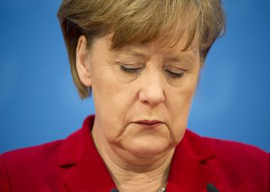
November 20, 2011

Angela Merkel
German historian Wolfgang Schivelbusch published a far-ranging 2003 study on the culture of defeated nations that focuses on three cases: the American South after the Civil War, the French after their defeat in the Franco-Prussian War in 1871, and Germany after WWI. According to Schivelbusch, defeated nations (Verlierernationen) as typified by the three cases he investigates stress myths that mitigate their defeat and create a favorable view of those who fought for their “lost cause.” Before its recent conversion to PC, the American South was paradigmatic for the way nations handle defeat, and there is little to be found in Germans’ attitudes after 1918 that does not mirror how the South saw itself after 1865.
Defeated powers, according to Schivelbusch, insist they were overwhelmed rather than really defeated, and they tend to pin the blame on their triumphant enemy’s unfair advantage or dishonorable tactics or on some internal foe who betrayed their side. The German legend of being knifed in the back in 1918 has its counterpart in the French view of the treacherous, cowardly government of Louis Napoleon that tricked them into war and then sued for peace against the Prussians; or the perfidy of General Longstreet, who supposedly showed his defeatist attitudes by joining the Reconstruction government after the Late Unpleasantness.
The only significant exception to the “culture of defeat” that Schivelbusch describes is his own country after 1945. In the introduction he suggests that the enormity and extravagance of the German exception may have driven him into writing his study. Unlike other societies he analyzes, including the Germans after WWI, contemporary Germans seem to luxuriate in “collective self-debasement.” Germans not only claim no honor for their soldiers in WWII but glorify their enemies who inflicted fire-bombing on their hapless civilians, or in the Soviet case, cut a swath across Central Europe murdering and raping. This ethic of self-rejection has gone so far that German historians and journalists delight in accepting blame for their wretched country in earlier European conflicts, and they typically view all of German history before 1933 as a lead-in to the Third Reich.
Such a mindset is evident in how German politicians present the decision to save the Greeks from their self-inflicted bankruptcy. Serious arguments could be cited for Angela Merkel and her Christian Democratic government’s decision to help out the profligate Greeks; for example, German creditors’ entanglement in the Greek debacle, Germany’s centrality as the EU’s economic force, and the German economy’s present dependence on the euro. Nonetheless, German politicians and intellectuals have appealed to the image of Germany as a moral leper in order to justify further loans to Greece and other “scapegrace” EU members. A leading German economic historian and a direct descendant of Germany’s renowned nineteenth-century classicist and theologian Albrecht Ritschl has insisted that such payments be viewed as the reparation debts that Germans never fully paid for starting WWI. Ritschl is upset that his countrymen were never sufficiently fined for the Great War’s horrendous crime, which has turned them “into the greatest debtor nation in world history.” Paying off the Greeks should be only a modest beginning in compensating the world for the sins of Kaiser Bill.